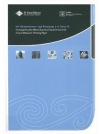This research paper provides a wider understanding of the characteristics of successful Māori businesses. The brief was to analyse thirty case studies and identify framework characteristics for future policy measures.
Purpose
The brief for this paper was to:
1. Analyse thirty case studies and conduct a survey to identify core business characteristics, themes and values; and
2. Identify framework characteristics for future policy measures.
Key Results
Businesses:
• Expect to grow signifi cantly over the coming decade in new markets (export and domestic)
• Operate more than a triple bottom line, balancing many competing demands, namely:
cultural, political, environmental, social development and commercial imperatives
• Operate with added legislative requirements, which inevitably leads to increased compliance costs
• Attract and retain talent and improve networks with key businesses
• Further develop governance and management skills, systems and structures to meet changing business requirements
• Are highly engaged in land, marine and export sectors and anticipate further diversification of assets, penetration in new sectors and land use changes.
The Māori organisations in the case studies are not homogeneous and do not perform equally in the same or in different markets. While they have many similarities there are notable differences. Possible explanations are that each type of organisation has specific purpose(s), operates in
different markets or segments and may be at a different stage in its business life-cycle:
• Tribal, pan tribal/social service type organisations may differ in their approach from the more commercial land incorporations/trusts and companies, yet they all mention and aspire to a Māori kaupapa
• It seems a matter of degree, how kaupapa/tikanga are applied
• The more pan/tribal/cause related businesses are generally domestic oriented (at times localised). Many of these derive a considerable amount of their income from government and non-commercial settings
• Those that have been engaged in commercial activities for some time may have different business models and operate in different markets, i.e. exports, and derive their income from commercial settings.

